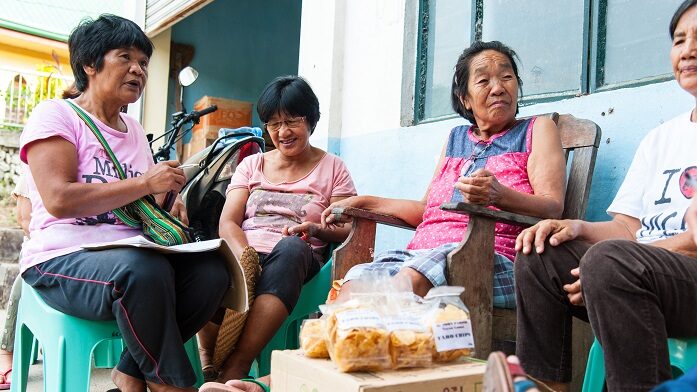ABM Archive Website
THIS WEBSITE CONTAINS ARCHIVE MATERIALS FOR HISTORICAL REFERENCE ONLY
For up-to-date information, including our latest appeals, news, and resources, please visit our current website.
Philippines Economic Empowerment update
 |
| Dolores Bayucca, pictured left, leads a meeting with her colleagues to discuss details of their taro chip business |
JUNE 2016
Fancy a healthy snack? If you were in Barangay Nayon in Lamut, Ifugao Province, we would highly recommend the Taro chips made by Dolores Bayucca and her colleagues. At 53 years old, Dolores is the chair of the women’s group at St John’s Mission in Nayon. These women have come together to both design and implement this taro chips activity.
The idea began in 2013 with a visit from the staff of ABM’s local partner organisation, ECARE, who spoke about using ‘Asset-Based Community Development’ (ABCD) to generate ideas in raising income. Basically, the ABCD approach encourages communities to look at what resources and skills they already have, and together think of what could be done to produce additional household income.
The women in Nayon did just that, and saw that there was plenty of the root vegetable, taro, growing around the place. Normally used as stock feed, this nutritious vegetable was clearly being under-utilised, and the idea of transforming it into a desirable snack grew from there.
Using a small loan from ECARE, the women began to grow, harvest, process and package taro as chips. This snack proved popular, and their loan was quickly repaid. ECARE even began purchasing the chips as food relief to the victims of Typhoon Haiyan, as they were seen as a healthy alternative to many other pre-packaged goods being donated.
Since that time, the initiative has continued to expand. There are at least 6 women regulars and up to 12 women able to work on the processing and packaging of the chips at any one time. Dolores and her group have been provided with a grant from the Philippines’ Department of Science and Technology (DOST) which will allow them to process other foods. DOST is assisting the group with an automatic chipper, slicer and a commercial oven, which will increase production as well as decrease the intensive work of cutting and slicing taro.
When asked about the income that Dolores has received from the chips, she beams with pride.
“I have been able to buy soap for my family, as I have seven children. And when St John’s Mission in Nayon started to build a church, our group was able to contribute 10,000 pesos! I think this project has encouraged other women and families in our community to grow taro to eat, as it grows so well and is good for living.”
The ABM Projects Coordinator, Lina Magallanes, commented that she has seen a significant improvement in the group’s financial and business skills. They now displayed confidence in managing the income and expenses of the project, discussing the details of administration, and an awareness of the importance of marketing strategies to expand their potential profits.
ABM would like to thank all our supporters and the Australian government who gave so generously to this project. The small investment has led to tangible livelihood improvement for people like Dolores, and is helping to empower communities in determining their own future.
If you would like to contribute toward future small business activities in the Philippines, please click here and select the project PH001EE Economic Empowerment.


